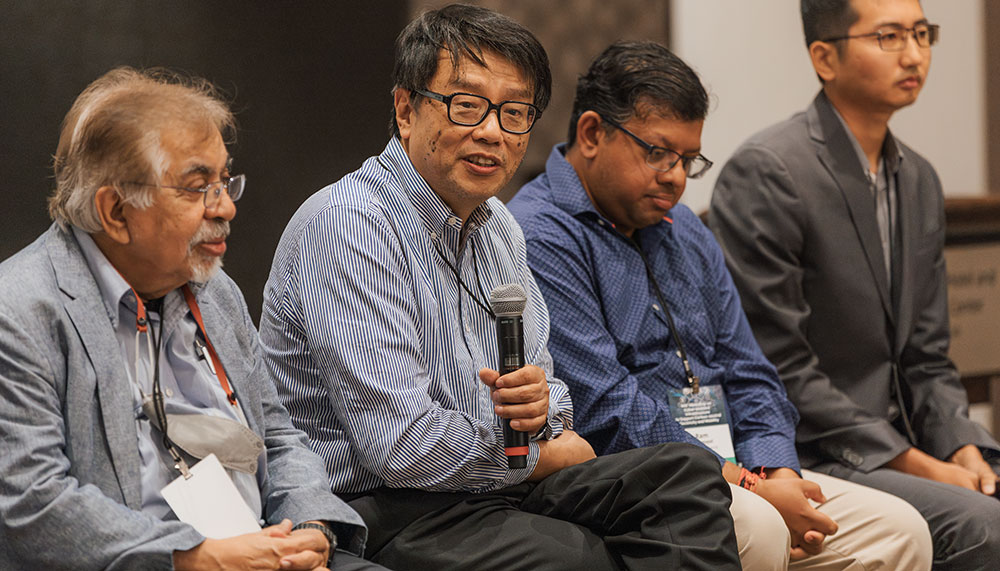
The Earth is experiencing more extreme weather than it has at any point in recorded history, and the most significant contributing factor since the mid-20th century is greenhouse gas emissions. One of the primary aspects in the effort to mitigate the negative effects of these events on society lies in transitioning the electricity and transportation sectors to a carbon-neutral infrastructure by integrating more renewable energy into electric power generation and electrifying a large portion of transportation.
To further this endeavor, Dr. Le Xie, a professor in the Department of Electrical and Computer Engineering at Texas A&M University, organized a National Science Foundation (NSF) workshop on April 24-25 at the Texas A&M campus to bring experts together as part of this effort. The goal of this workshop was to establish the critical cyber infrastructure for research and education toward carbon-neutral electricity and mobility, focusing on four major challenges — power and transportation systems, artificial intelligence and machine learning, the carbon-neutral transition, and the socio-economic infrastructure and cyber-enabled research infrastructure.
The two-day conference, hosted by the Department of Electrical and Computer Engineering and the Texas A&M Engineering Experiment Station, featured keynote presentations from Pat Wood III, CEO at Hunt Energy Network, and Steven Low, Frank J. Gilloon Professor of Computing and Mathematical Sciences and Electrical Engineering at the California Institute of Technology.
We are honored to have the confidence from NSF to bring the best minds in power systems, transportation systems, data sciences and social justice to shape the research agenda of carbon-neutral electricity and mobility.
Wood drew upon his experience of serving as the chairman of the Federal Energy Regulatory Commission (FERC) under former President George W. Bush, during which he led the responses to the 2000-01 California energy crisis, the bankruptcy of Enron and the 2003 North American power blackout. By the end of his term, over two-thirds of the nation was served by the reliable, organized wholesale power markets FERC championed. In his talk, he presented a market-driven and practical-oriented approach to achieving deep decarbonization and emphasized the importance of data, models and university research.
Low’s research interests lie in power systems, cyber-physical systems, network architecture and energy-efficient networking. During his talk, Low explained the Adaptive Charging Network designed at the California Institute of Technology for smart electric vehicle charging. He also demonstrated the value of tapping under-utilized workplace energy systems.
The event included four panel sessions, which focused on the four major challenges of this necessary transition and were moderated by a prominent researcher with relevant expertise. These panels concluded by prescribing a path forward for developing efficient transportation networks, developing novel artificial intelligence/machine-learning tools for accelerating the carbon-neutral transition, and noting the rising carbon emission along racial and ethnic lines.
The first day concluded with a lightning talk session that broadly focused on power grid reliability, efficient design of electricity markets and the design of combined electricity and transportation networks, among other topics.
The final session of the workshop centered on building a cross-domain cyber infrastructure in synergy with current NSF activities and programs that could help with research infrastructure for carbon-neutral power system research. The event concluded with a talk by Xie on this evolving and important endeavor.
"We are honored to have the confidence from NSF to bring the best minds in power systems, transportation systems, data sciences and social justice to shape the research agenda of carbon-neutral electricity and mobility,” Xie said. “It is very gratifying to hear the attendees praise the intellectual intensity and the Aggie hospitality of this workshop. I am very grateful for the entire organizing team's efforts in putting this together."
In addition to Xie, other members of the organizing committee included Dr. Mahnoosh Alizadeh from the University of California, Santa Barbara; Dr. Yan Liu from the University of Southern California; Dr. Scott Moura from the University of California, Berkeley; Dr. Yafeng Yin from the University of Michigan, Ann Arbor; and Dr. Apurv Shukla, postdoctoral associate at Texas A&M.